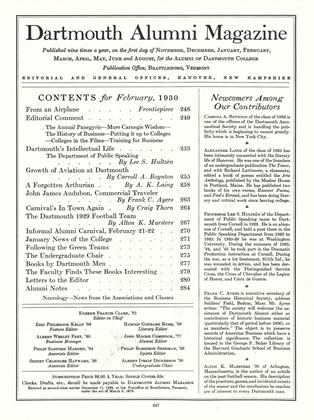By H. Meltzer (Lecturer in Psy- chology, Washington University) and E. M. Bailor (Professor of Psychology, Dartmouth College). N. Y., Harcourt, Brace & Co., 1929. iv: 199.
An experienced and versatile teacher once remarked that psychology is the most difficult subject in the curriculum to teach. Most psychologists, I think, would endorse his conviction, and would hasten to add that among their courses in psychology the elementary course gives them the greatest concern. If one may judge from the profuse stream of text-books which issues every year from the press, few teachers are satisfied with any approach to psychology other than their own—if indeed they are satisfied with that.
Developed Lessons is one of these recent experiments in introductory instruction, but it has more distinctive marks than most of its companions. Although designed as a book for beginners, it nevertheless invites, and requires, the student to read widely in the standard literature of the subject, frequently in original sources. The lessons themselves serve merely to integrate the diverse reading and to provide the student with an instrument by which to measure his progress.
For example, if it is a question of the drives or urges in human behavior, the student is first given a brief outline of the history and status of the problem and directed to read chapters for orientation in three standard texts. Next he is referred to original theories concerning the mainsprings of human action, with a list of Leitfragen to guide his reading. Assignments from experimental studies on animals and infants follow in order that the student may become familiar with the application of the objective method. Finally the problem of the classification of drives is examined with the aid of the best available references. Such a survey would ordinarily be too spacious and too loose for the elementary student, but the use of guiding questions serves very well to cement the scattered references and to give direction to the student's thinking. The book aims to provide both continuity and variety in the development of a topic, and succeeds in achieving considerable unity in a rich diversity.
Following each topic the student finds a review of the concepts he has met in his reading, and also a test to serve both as a drill and as a measure of the effectiveness of his study. These tests are of the objective type, and they constitute a distinctive and original feature of the book. In the appendix the student finds the correct answers, and a table by which to compare his achievement with that of many students of the same degree of advancement. This device undoubtedly provides the student with incentive, and utilizes the established principle that improvement can be made only when one knows the nature and frequency of one's errors.
The purpose of the authors is the induction of the beginner into the field of psychology with the aid of concrete and precise direction. The guidance is so detailed and so thorough that the role of the individual teacher seems to be considerably reduced, a consequence which has both its welcome and unwelcome aspects. A by-product of this thoroughness lies in the added value which the book acquires for private study. Extension courses should discover it, as well as all those who must proceed on the perilous path of psychological study by themselves.
 View Full Issue
View Full Issue
More From This Issue
-
 Class Notes
Class NotesCLASS OF 1923
February 1930 By Truman T. Metzel -
 Article
ArticleA Forgotten Arthurian
February 1930 By Alexander Laing -
 Lettter from the Editor
Lettter from the EditorEditorial Comment
February 1930 -
 Sports
SportsThe Dartmouth 1929 Football Team
February 1930 By Alton K. Masters, '30 -
 Article
ArticleGrowth of Aviation at Dartmouth
February 1930 By Carroll A. Boynton '32 -
 Class Notes
Class NotesCLASS OF 1929
February 1930 By Frederick W. Andres
Books
-
 Books
BooksVolume three of the Dictionary of American Biography, published
January, 1930 -
 Books
BooksTHE LATE GREAT CREATURE.
APRIL 1972 By J. DONALD O'HARA '53 -
 Books
BooksKEATS'S METAPHORS FOR THE POETIC IMAGINATION.
NOVEMBER 1967 By JAMES A.W. HEFFERNAN -
 Books
BooksTHE COURT OF VIRTUE.
April 1962 By ROBERT G. HUNTER -
 Books
BooksO NEGRO NA FICCAO BRASILEIRA.
JANUARY 1967 By RONALD C. TURNER -
 Books
BooksTHE EVOLUTION OF A MEDICAL CENTER: A HISTORY OF MEDICINE AT DUKE UNIVERSITY TO 1941.
NOVEMBER 1972 By WILLIAM L. WILSON '34

